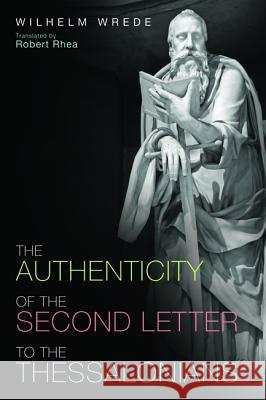The Authenticity of the Second Letter to the Thessalonians » książka
The Authenticity of the Second Letter to the Thessalonians
ISBN-13: 9781498292702 / Angielski / Miękka / 2017 / 134 str.
The Authenticity of the Second Letter to the Thessalonians
ISBN-13: 9781498292702 / Angielski / Miękka / 2017 / 134 str.
(netto: 72,60 VAT: 5%)
Najniższa cena z 30 dni: 74,97
ok. 16-18 dni roboczych.
Darmowa dostawa!
Scholars continue to debate whether Second Thessalonians was written by Paul or by pseudonym. The position that the letter is a late imitation is largely based on the comparison of the parallel expressions of two epistles to the Thessalonians. There are more words and phrases that are shared between these two letters than there are in any other two New Testament letters. William Wrede's study is the ultimate source of scholarly perception of these parallels. Not only does Wrede locate some exact parallels, he also finds definite words, verses, and related passages that precisely mirror and reflect their counterparts in First Thessalonians. Scholars who conclude that Second Thessalonians is pseudonymous owe much of that conclusion to Wrede's work. Wrede's order of the Greek parallels has been reproduced with his original annotations in this translation. ""Rhea has made a valuable contribution to Pauline (and especially Thessalonians) scholarship. Not only has he made sure that William Wrede's Die Echtheit des zweiten Thessalonicherbriefs Untersucht is in print again, but his translation makes Wrede's detailed authorship arguments accessible to a broader audience."" --Benjamin E. Reynolds, Associate Professor of New Testament, Tyndale University College, Toronto ""Whether or not one agrees with Wrede's analysis of the Thessalonian correspondence, his treatment of its unity and disunity is essential reading for New Testament scholars. Now ably translated by Robert Rhea, this text makes a valuable contribution to Pauline studies, within the English-speaking world and beyond."" --Paul N. Anderson, Professor of Biblical and Quaker Studies, George Fox University Robert Rhea is a graduate of Davidson College, Union Theological Seminary, The Jewish Theological Seminary of America, and studied at the University of Marburg with Georg Werner Kuemmel, at the Ludwig-Maximilians University of Munich with Werner Vordtriede, and at the Evangelisch-Theologische Fakultaet of the University of Vienna. At Union Theological Seminary he wrote a thesis entitled The Johannine Son of Man (1990).
Scholars continue to debate whether Second Thessalonians was written by Paul or by pseudonym. The position that the letter is a late imitation is largely based on the comparison of the parallel expressions of two epistles to the Thessalonians. There are more words and phrases that are shared between these two letters than there are in any other two New Testament letters. William Wredes study is the ultimate source of scholarly perception of these parallels. Not only does Wrede locate some exact parallels, he also finds definite words, verses, and related passages that precisely mirror and reflect their counterparts in First Thessalonians. Scholars who conclude that Second Thessalonians is pseudonymous owe much of that conclusion to Wredes work. Wredes order of the Greek parallels has been reproduced with his original annotations in this translation.""Rhea has made a valuable contribution to Pauline (and especially Thessalonians) scholarship. Not only has he made sure that William Wredes Die Echtheit des zweiten Thessalonicherbriefs Untersucht is in print again, but his translation makes Wredes detailed authorship arguments accessible to a broader audience."" --Benjamin E. Reynolds, Associate Professor of New Testament, Tyndale University College, Toronto""Whether or not one agrees with Wredes analysis of the Thessalonian correspondence, his treatment of its unity and disunity is essential reading for New Testament scholars. Now ably translated by Robert Rhea, this text makes a valuable contribution to Pauline studies, within the English-speaking world and beyond.""--Paul N. Anderson, Professor of Biblical and Quaker Studies, George Fox UniversityRobert Rhea is a graduate of Davidson College, Union Theological Seminary, The Jewish Theological Seminary of America, and studied at the University of Marburg with Georg Werner Kuemmel, at the Ludwig-Maximilians University of Munich with Werner Vordtriede, and at the Evangelisch-Theologische Fakultaet of the University of Vienna. At Union Theological Seminary he wrote a thesis entitled The Johannine Son of Man (1990).











